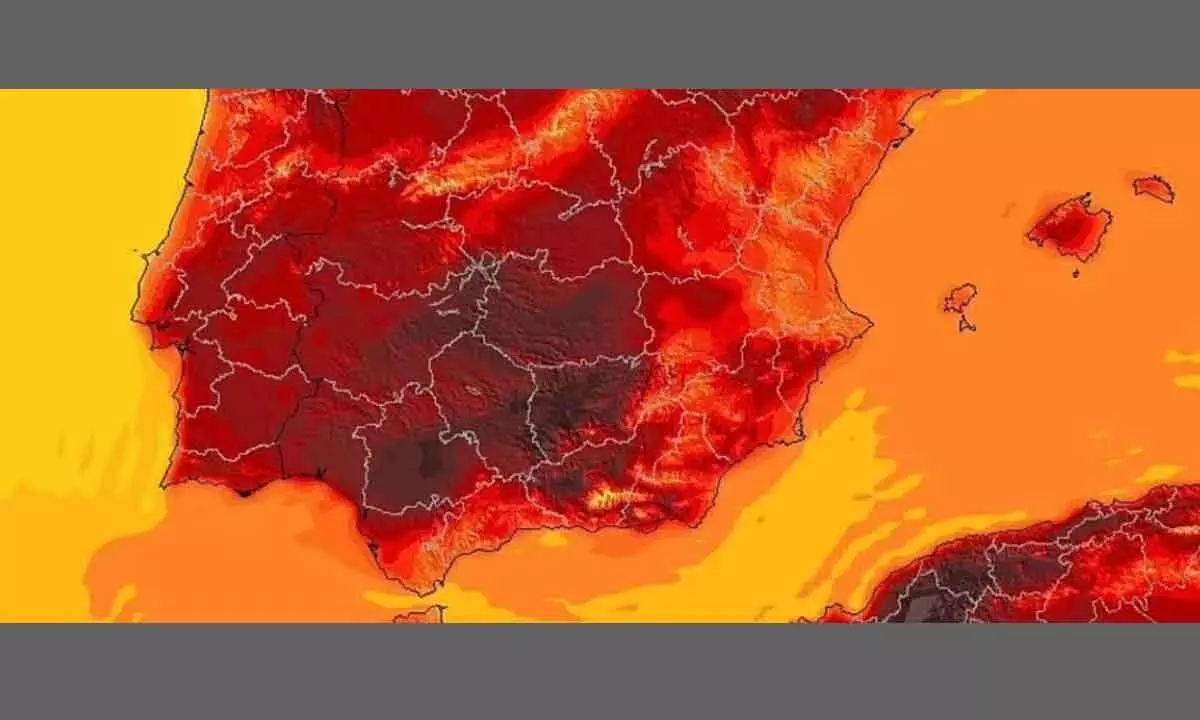Live
- Faeces forced into tribal woman’s mouth
- Hyderabad's Air Quality Worsens as Winter Settles In | AQI Levels Reach Moderate Range
- Dead' Man Wakes Up En Route To Cremation In Rajasthan; Three Doctors Suspended
- Odisha to study root causes for migration of labourers
- Forest officials accountable for wildlife deaths: Minister
- WhatsApp Update: WhatsApp Introduces Voice Note Transcription
- We now know sacrifice of many national heroes: CM
- Miscreants attack Dharmasala MLA Himanshu
- Salman Khan’s ‘Biwi No 1’ to Re-Release on November 29
- 7 kg ovarian tumour removed
Just In
Scientists Have Named A Heat Wave For The First Time


The temperatures in Spain in May 2022 – before the arrival of Zoe (European Centre for Medium-Range Weather Forecasts/CC BY 4.0)
- A heat wave termed as Zoe has been given a name for the first time by scientists.
- Humans have traditionally given hurricanes names, and in 2012 the United States adopted the unofficial practise of nicknaming winter storms.
A heat wave termed as Zoe has been given a name for the first time by scientists.The heat wave that caused temperatures to climb to 112 degrees Fahrenheit in Seville between July 24 and July 27 was given the name by Spanish scientists.
Jose Mara Martn Olalla, an associate professor in the department of condensed matter physics at Sevilla University, told the newspaper that the initiative is a fresh attempt to inform the public about severe temperatures and caution them of the hazards.Humans have traditionally given hurricanes names, and in 2012 the United States adopted the unofficial practise of nicknaming winter storms. The first heat wave to be presented a name is Zoe.
The Adrienne Arsht-Rockefeller Foundation Resilience Center of the Atlantic Council, a research centre and non-profit organisation with headquarters in Washington, came up with the name for the proMETEO Sevilla Project. The project's pilot site is Seville, and its goals are to increase public awareness of high heat and to promote initiatives to lessen the risks associated with heat waves.
Heat waves don't just occur on warm days. The Spanish State Meteorological Agency defines them as periods of at least three consecutive days in July and August between 1971 and 2000 in which at least 10% of weather stations record maximum temperatures over the 95th percentile.
Although the term "heat wave" has no universally accepted definition in the United States, the Environmental Protection Agency (EPA) uses a benchmark of at least two days where the daily minimum temperature, adjusted for humidity, is higher than the 85th percentile for July and August between 1981 and 2010.
Heat waves can be harmful, especially to vulnerable groups like the elderly and persons who work outside in physical labour. The World Health Organization (WHO) estimated in 2018 that 125 million more individuals per year were exposed to excessive heat between 2000 and 2016.
According to the organisation, 8 million Americans will endure heat indexes above 125 degrees Fahrenheit this year, a startling 107 million will do so by the year 2053. The first named heat wave may be Zoe, but it won't be the last. For upcoming heat waves, Spanish authorities intend to alternate male and female names in reverse alphabetical order.

© 2024 Hyderabad Media House Limited/The Hans India. All rights reserved. Powered by hocalwire.com






